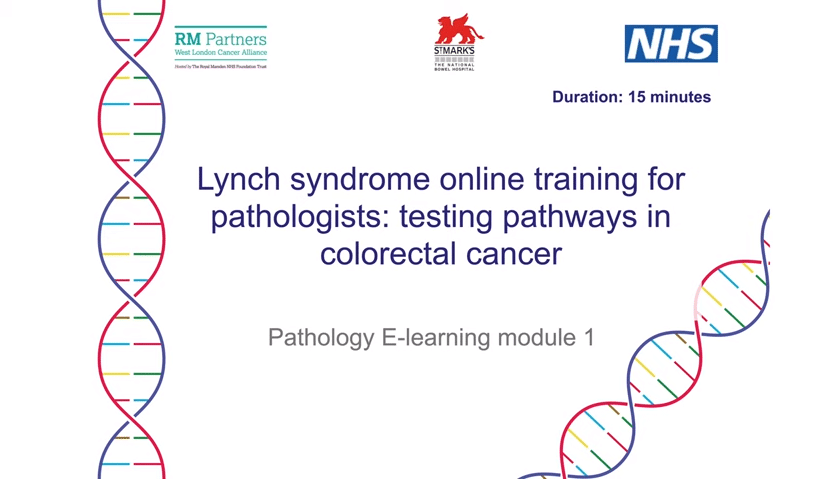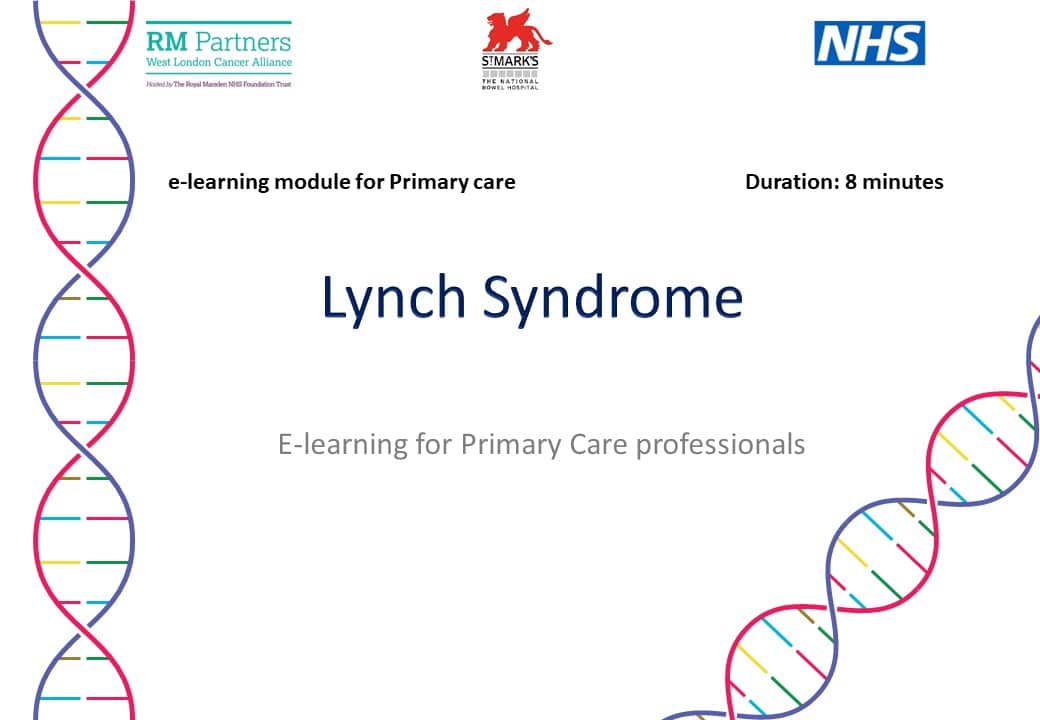Curated collections
Explore our themed educational resources and build your knowledge of genomics in healthcare

Lynch Syndrome
Lynch Syndrome is an inherited condition which results in an increased risk of certain cancer types. These resources provide information on Lynch syndrome and the NHS GMS National Lynch Syndrome project which is led by the North Thames GMSA.
To watch the previous ‘back to basics’ workshop, click here.
For a more advanced session, watch a recording of the previous follow-up workshop here.
The regional Lynch syndrome nurses are:
North Thames GMSA Region:
Anna Koziel
South West GMSA Region:
Sarah John
Siobhan John
South East GMSA Region:
Aela Limbu
North West GMSA Region:
Miranda Darbyshire
North East GMSA Region:
Amy Sanderson
Karen Westaway
Rebecca Foster
East GMSA Region:
Melissa Cambell-Kelly
Central GMSA Region:
Felicity Blair
n this workshop, Laura Monje-Garcia (National Lynch Syndrome Project Lead Nurse, North Thames GMSA), Tracie Miles (Associate Director of Nursing and Midwifery, South West GMSA), and the regional Lynch syndrome nurses provide information about the testing pathway, role of the nurse, and mainstreaming germline genetic testing in routine oncology clinics. This workshop is a follow-up session from the previous sessions held in November/December 2022, a recording of which can be watched here.
The regional Lynch syndrome nurses are:
North Thames GMSA Region:
Anna Koziel
South West GMSA Region:
Sarah John
Siobhan John
South East GMSA Region:
Aela Limbu
North West GMSA Region:
Miranda Darbyshire
North East GMSA Region:
Amy Sanderson
Karen Westaway
Rebecca Foster
In this workshop, Laura Monje-Garcia (National Lead Nurse for the Lynch Syndrome Project, North Thames GMSA), Tracie Miles (Associate Director of Nursing and Midwifery, South West GMSA), and the regional Lynch syndrome nurses explain the basics of Lynch syndrome, the testing pathway, and the role of the nurse.
This video is aimed at nurses looking for an introduction to Lynch syndrome and the project, and covers the basics. If you are interested in a more advanced session, you can watch a recording of the previous workshop here.
The regional Lynch syndrome nurses are:
North Thames GMSA Region:
Anna Koziel
South West GMSA Region:
Sarah John
Siobhan John
South East GMSA Region:
Aela Limbu
North West GMSA Region:
Miranda Darbyshire
North East GMSA Region:
Amy Sanderson
Karen Westaway
Rebecca Foster
In this workshop, Laura Monje-Garcia (National Lynch Syndrome Project Lead Nurse, North Thames GMSA), Tracie Miles (Associate Director of Nursing and Midwifery, South West GMSA), and the regional Lynch syndrome nurses provide information about the testing pathway, role of the nurse, and mainstreaming germline genetic testing in routine oncology clinics.
The regional Lynch syndrome nurses are:
North Thames GMSA Region:
Anna Koziel
South West GMSA Region:
Sarah John
Siobhan John
South East GMSA Region:
Aela Limbu
East GMSA Region:
Kirsti Withington
On 14 July 2022 the North Thames Genomic Medicine Service (GMS) held an event showcasing how genomic medicine is transforming healthcare in our region.
Lynch Syndrome is an inherited condition caused by an inherited DNA repair pathway defect which results in an increased risk of colorectal, endometrial, and other cancers. 1 in 400 people in the UK are affected by Lynch syndrome, but only an estimated 5% of those people have been diagnosed.
Dr Kevin Monahan, Consultant Gastroenterologist at the Lynch Syndrome Clinic, St Mark’s Hospital, is the lead for NHS England’s National Lynch Syndrome Project. In this presentation he introduces the project and its aims to increase diagnoses of Lynch syndrome in patients with colorectal or endometrial cancer.
This webinar is part of the Genomics Lunch and Learn series for nurses and midwives, to provide an insight into how genomic testing is used across different areas of healthcare.
This session introduces Lynch Syndrome and discusses the patient pathway, criteria for genetic testing, as well as the role of the nurse and the genetic team when providing information and care to a patient and their family.
Speakers and topics covered:
An introduction to Lynch Syndrome and the tumour pathway – a case discussion
Dr Adam Shaw – Consultant in Clinical Genetics, Guy’s and St Thomas’ NHS Foundation Trust
Genetic testing – the germline pathway and challenges for the patient and family members
Andrea Forman – Principal Genetic Counsellor, St George’s University Hospitals NHS Foundation Trust
The role of the nurse now and in the future
Vicky Cuthill – Nurse Consultant, St Mark’s Hospital
A patient perspective – Tracy’s story
Tracy Smith – Trustee for Lynch Syndrome UK

Lynch syndrome is a cancer predisposition syndrome in which the main concerns are colorectal and endometrial cancer. There is also a risk of other cancers, although less frequently.
The National Lynch Syndrome Project Team (lead by the North Thames & South East GMSA teams), in collaboration with Dr Nicholas West, Associate Professor of Pathology and Honorary Consultant in Gastrointestinal Pathology, University of Leeds, have launched an online training for pathologists which is currently available via the RM Partners West London Cancer Alliance.
This training includes modules focussed on both colorectal cancer and endometrial cancer pathways. It is recommended that participants take the modules and tests specific to the cancer pathway they work within.
The training involves watching two short videos which cover all the different stages of the Lynch syndrome pathway, and then completing the two related online questionnaires to ensure that you have understood correctly the processes and procedures for testing. In addition, the training provides a range of supporting documents to help understand this pathway.

Lynch syndrome is a cancer predisposition syndrome in which the main concerns are colorectal and endometrial cancer. There is also a risk of other cancers, although less frequently.
RM Partners West London Cancer Alliance, in collaboration to Dr Kevin Monahan & Laura Monje-Garcia and as part of the National Lynch Syndrome Project, have launched a short piece of online training for primary care clinicians.
The training will help primary care physicians manage their Lynch syndrome patients as they first present at the GP surgery, and it covers the following:
- A brief overview of Lynch syndrome
- Their personalised cancer prevention programme
- An introduction to the ‘Lynch syndrome quick guide’ and how it can help you identify and manage your patient’s care
- How to manage their first-degree family members’ care
There is also ‘Lynch syndrome quick guide for primary care clinicians’ document available.